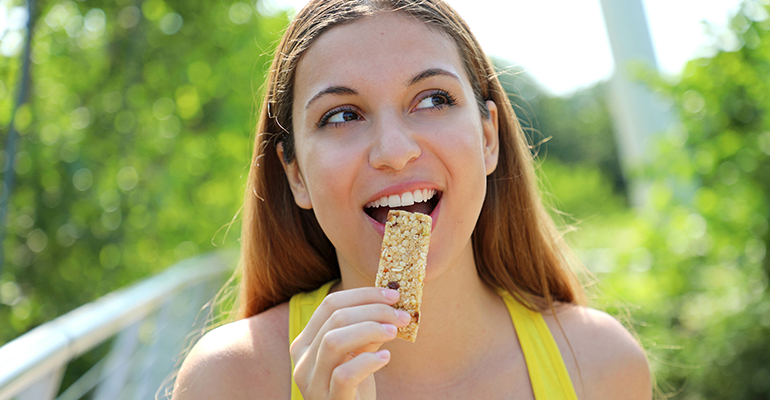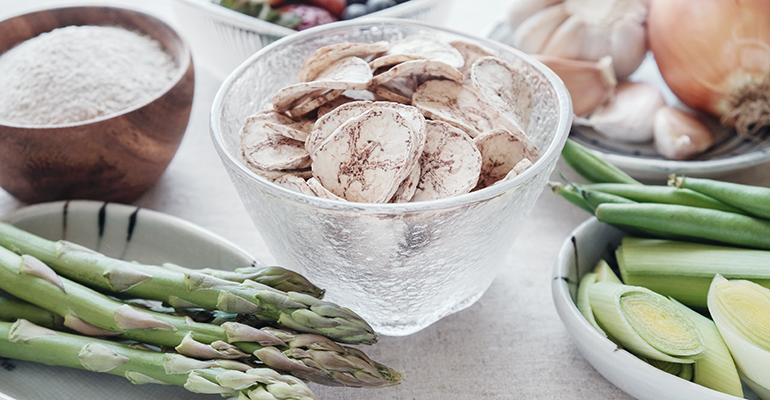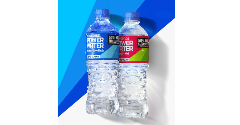News
Innovations in prebiotics: Developing indulgent treats that are good for the gut
24 Mar 2023
Growing consumer awareness around the link between diet and health is fuelling demand for increased-fibre, reduced-sugar products. Functional soft drink brand Olipop and healthy snack maker Uplift Food are making the most of this trend.
Prebiotics are substrates that act as a food source for the healthy bacteria in the gut microbiome. They occur naturally in many fruits and vegetables, particularly those with a high carbohydrate and fibre content, such as garlic, asparagus, chicory root, and onion.
As well as promoting prebiotic and digestive health benefits, prebiotic ingredients such as inulin, fructo-oligosaccharides, and polydextrose, can improve the nutritional profile of food products by supporting sugar or fat reduction. Between 2016 and 2020, almost one in five product launches globally with a keto claim (19%); low- no, or reduced carb claim (18%); or a low or reduced sugar claim (16%) contained prebiotic ingredients, according to Mintel.

With interest in the gut-brain axis growing, brands are experimenting with adding prebiotic ingredients to food and drink products to appeal to a growing contingent of health-conscious consumers. Yet, gut health is still a relatively new area of interest for many, so brands must be intentional about how they position products with digestive and gut health claims before mass market acceptance is achieved.
The fizzy sodas offering a reduced-sugar fibre boost
One brand leveraging the trend is US-based functional soft drink manufacturer Olipop. The company produces better-for-you sodas, which are available in a range of “nostalgic” flavours from cola to cream soda, and contain up to 37g less sugar and 9g more fibre than traditional soft drinks currently on the market.
To create its drinks, Olipop uses dissolvable, powdered forms of soluble fibres from various plants, such as cassava fibre, chicory root, and Jerusalem artichoke. Appealing to the clean-label trend, the products are non-GMO and do not contain artificial sweeteners, preservatives, colours, or flavours. As of early 2023, Olipop sodas are available in over 20,000 stores throughout the US, and the company plans to expand supply internationally in future.
“On average, Americans get less than […] 10% of what our hunter-gatherer ancestors consumed. Increasing fibre, prebiotics, and nutritional diversity is a great way to improve digestive and microbiome health. We formulated Olipop to make it easier for people to reach adequate daily fibre intake to be more like our hunter-gatherer ancestors and make positive steps to supporting digestive health by crafting a soda that is easy to enjoy and share,” the company says.
Most people worldwide today are fibre deficient. The average American consumes less than one third of the Food Drink Authority (FDA) daily recommended amount of fibre. And even in Ghana, the country with the highest daily fibre intake, fewer than half (43%) of the population meet the recommended fibre dietary guidelines, studies show.
Healthy snacking, backed by science
As consumers feel the pinch from record high inflation and a global cost-of-living crisis, many are seeking out snacks as an affordable, everyday treat, Euromonitor data shows. However, snacks such as biscuits, confectionery, and baked goods, are often low in nutritional value and high in refined sugar and saturated fats.
Attempting to satisfy the consumer demand for healthy and indulgent treats, New York-headquartered startup Uplift Foods has developed plant-based cookies that offer a low-sugar and keto-friendly substitute to similar baked goods. Created from a blend of prebiotic soluble fibre, insoluble fibre, and prebiotic resistant starch ingredients including lupin, tapioca fibre, tigernut, and kiwi fruit powder, the startup’s Gut Happy Cookies provide 47% of the daily recommended fibre intake. As well as being gluten-free and non-GMO, the cookies are free of artificial colours, flavours, sweeteners, sugar alcohols, and preservatives.
 Pictured: Variety of prebiotic foods | © AdobeStock/SewcreamStudio
Pictured: Variety of prebiotic foods | © AdobeStock/SewcreamStudio
To prove the prebiotic health benefits associated with eating its product, Uplift Food performed a human clinical research study, which found a positive significant increase in the good gut lactobacillus bacteria compared to a control batch.
“We’re not just another cookie with marketing claims. That’s why we performed a clinical study by an accredited university, which confirmed that gut health benefits increased after patients consumed one serving per day for a week. This data proves that our unique blend of gut happy nutrients supports good digestion and ultimately helps the body feel uplifted," said Kara Landau, founder of Uplift Food.
In 2019, global snack food producer Mondelēz International acquired a minority stake in the company via its SnackFutures innovation and venture hub.
Consumer awareness could be an obstacle to prebiotic success
Although prebiotic claims rose by 42% from 2016 to 2021, consumer awareness of the role of such ingredients remains low, according to Mintel. This could be a barrier to the mass market success of products positioned as offering prebiotic benefits.
“Soluble fibres such as inulin are probably the best-known of the prebiotics, but even inulin isn’t often marketed as a prebiotic, which might demonstrate the need to educate the consumers on how prebiotics could contribute to their digestive health,” said Megan Eade, Innovation Technologist at RSSL, speaking at Fi Europe 2021.
To combat this, some brands are choosing to replace prebiotic with high fibre claims or combine pro- and prebiotics in products to capitalise on the existing consumer recognition of probiotics in the digestive wellness space.
Related news

Oat Barista: Innovation for game-changing beverages
20 Nov 2025
Oat Barista is a clean label, sustainable, and innovative drink base specifically designed to create the perfect foam in one single ingredient.
Read more
How younger consumers are redefining ingredient choices and rejecting brand loyalty
18 Nov 2025
Gen Z and millennial consumers’ preferences for transparency, functionality, and purpose are “redefining the very nature of consumption itself”, says SPINS.
Read more
Hybrid formats and flexible positioning to disrupt category norms in 2026
17 Nov 2025
Trend forecasters expect food and drink to move more fluidly across occasions, functions, and formats as consumers seek versatility, novelty, and convenience.
Read more
Danone highlights digestive health as potential ‘tipping point’ for food industry
13 Nov 2025
Danone is betting on a food industry “tipping point” that will bloat the market for healthy products, particularly those related to gut health.
Read more
New UPF standard hoped to offer consumers ‘coherence and clarity’
10 Nov 2025
Ingredients companies are being urged to enter “a new era of partnership and innovation” following the launch of the industry’s first non-UPF verification scheme.
Read more
Faravelli at Fi Europe: Showcasing FARA® functional solutions for food and nutra
28 Oct 2025
At Fi Europe 2025 in Paris (stand 72M39), Faravelli showcases FARA® Customized Functional Solutions and a wide ingredient portfolio for food and nutra – delivering quality, innovation, and expertise.
Read more
Agrigum Redefined FIBER
27 Oct 2025
Agrigum has transformed gum acacia into a natural, science-backed fibre that supports gut health, sustainability, and innovation across global food and nutrition applications.
Read more
Expanding boundaries in food & beverage innovation
23 Oct 2025
IMCD and FrieslandCampina Professional expand partnership to deliver Kievit® across EMEA, enabling brands to enhance quality and accelerate time-to-market for tomorrow’s food & beverage creations.
Read more
Amazon Grocery launch aims to balance quality with affordability
22 Oct 2025
Global e-commerce giant Amazon has introduced a new private-label food brand, combining existing Amazon Fresh and Happy Belly products with new everyday items.
Read more
Powerade enters hydration space with launch of Power Water
21 Oct 2025
Coca-Cola’s Powerade brand has launched a zero-sugar, electrolyte-enhanced functional water, marking the brand's entry into the hydration space.
Read more